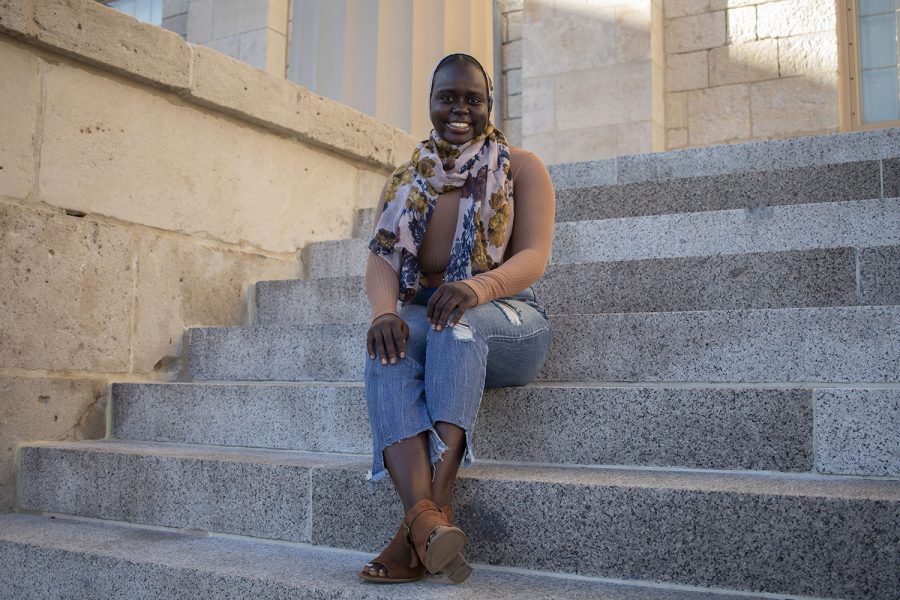‘We are not there yet:’ pandemic brings new focus to Human Rights Day
Instead of celebrating achievements during Human Rights Day this year, activists are recognizing realities of inequality illuminated by the pandemic.
A Global Health Major, Amani Ali, is seen on the Pentacrest at the University of Iowa on Dec. 9, 2020, the day before Human Rights Day. Amani, as well as many others, recognize that there is a lot of work to be done for the advancement of human rights, as seen during the pandemic with problems like the human right to health care.
December 9, 2020
For this year’s Human Rights Day, Iowa activists said they want to focus on health as a human right as the pandemic brings disparities in health care access to light.
Dec. 10 marks the 72nd anniversary of the United Nations Declaration on Human Rights, celebrated as ‘Human Rights Day’ by the UN. The theme for 2020 is ‘Recover Better: Stand up for Human Rights.’
Amani Ali, UI senior, and refugee from Sudan said that as a global health studies major, the pandemic made it clear that those who are suffering the most are those at the bottom who don’t have the care they need. She said she wished more people realized that not everyone has access to the human right to health through health care –– even in the U.S.
The pandemic should serve as a lesson for people to better understand and learn about these human rights disparities, Ali said.
“Educating people, making people aware that human rights are human rights is really important,” Ali said. “Because every single human being matters.”
The University of Iowa Center for Human Rights will celebrate the holiday with a guest speaker, Marcella David. For the first time, the event will be virtual, said Adrien Wing, director of the UI Center for Human Rights.
David, who currently serves as provost at Columbia College in Chicago will lead a brief speech followed by questions and discussion titled ‘International Human Rights: Which Way in 2020’ at noon on Dec. 10. A former UI College of Law faculty member, David, was selected because of her specialty and experience in international law, Wing said.
“The pandemic has affected everything on the planet, so that includes everything to do with human rights,” Wing said.
The virus can violate or limit the right to health, anti-discrimination, equality, education, and employment, Wing said. It can also affect poor people, people of color, and women disproportionately.
According to the Center for Disease Control and Prevention, 52.1 percent of positive COVID-19 cases were female, while 47.8 percent were male. 23.7 percent of positive cases were among Hispanic or Latino people and 13.8 percent were among Black people.
According to the U.S. Census Bureau, Hispanic and Latino people make up 18.5 percent of Americans, and Black people make up 13.4 percent of the country.
While white people make up 76.3 percent of Americans, they account for only 53 percent of individuals who have tested positive for COVID-19.
White people account for 58 percent of the U.S. deaths from COVID-19, while Hispanic and Latino people account for 14.6 percent, and 18.2 percent of deaths were Black people.
The United Nations Association’s Iowa branch is celebrating international Human Rights Day in two ways, said Debra DeLaet, president of the chapter. The UN Association is co-sponsoring a film screening and discussion of the movie “White Privilege,” on Thursday in collaboration with the Iowa Commission on Human Rights and the Johnson County chapter of the UN Association, DeLaet said.
The second event held on Tuesday was a human rights networking event for college students and Iowa’s youth.
The COVID-19 pandemic has exacerbated issues of human rights, DeLaet said. Especially the human right to health. In Iowa alone, there has been nearly a quarter of a million positive cases and about 2,900 deaths. DeLaet said she thinks the pandemic has illuminated the weaknesses of the human rights system.
There are socioeconomic inequities that precede the pandemic that make people more vulnerable than others to bad outcomes, and health care is less accessible for specific populations, DeLaet said.
“These are all things that have been part of our society long before the pandemic,” DeLaet said. “… These health disparities and other socioeconomic disparities lead to disproportionate harm for communities of color.”
These disparities aren’t rooted in one administration. They come from inequities embedded into society. And it’s not just a national or global issue, DeLaet said, noting the importance of work at the community level when promoting human rights. There need to be better enforcement mechanisms for implementing human rights norms into society, DeLaet said.
“We need to take inspiration from the Universal Declaration of Human Rights. And we need to take inspiration from these human rights norms that have been developed at the international level,” DeLaet said. “But we have to do the work. This is painstakingly slow work –– to transform our communities in ways that are more likely to support human rights. So, it starts in our neighborhood, it starts at our backyard.”
According to the United Nations, the UN Declaration on Human Rights is the most translated document globally.
However, the proclamation does not carry any legislative weight, UI Professor and Ambassador Ronald McMullan said, and is mainly aspirational.
While the world has come a long way since 1948, McMullen––who served as human rights advocate throughout his diplomacy roles abroad––said, 2020 has demonstrated there is still a long way to go.
Access to human rights should not be excluded or limited on the basis of categories of people, McMullen said. The U.S. needs to remain cognizant of this, McMullen said, as the pandemic and recent election have exposed a severe disconnect among groups.
“We’re not there yet,” McMullen said. “And I think this year has really demonstrated that domestically in the U.S., human rights aren’t only an issue for other countries, but it’s one that we need to keep in mind as well.”






